12 of the best competitive intelligence tools for marketers
Written by Mahnoor Sheikh
Published on February 7, 2024
Reading time 7 minutes

Your business’s success hinges on several factors, one crucial element is your ability to understand and adapt to your competitors. Responding effectively to their strategies can make all the difference in propelling your business forward.
According to Crayon’s 2023 State of Competitive Intelligence Report, 66% of stakeholders say competitive intelligence (CI) is important to their success.
The challenge? Gathering and analyzing massive amounts of competitive data. This is where competitive intelligence tools can help.
In this post, we’ll introduce you to 12 of the best competitive intelligence tools for marketers. We’ll also discuss the benefits of using these tools and how to make the most of them.
What is a competitive intelligence tool?
A competitive intelligence tool enables businesses to gather and analyze information about their competition. These tools help companies understand what their competitors are doing by tracking their marketing activities, interactions and overall performance.
Marketers use CI tools to learn from their competitors, anticipate their moves, identify gaps and opportunities in the market, stay on top of industry trends and develop competitive strategies that help their business stay ahead of the game.
How to use competitive intelligence tools to grow your business
Competitive intelligence tools make it easier to collect, analyze and distribute competitive research, especially when you’re dealing with astronomical amounts of data and dozens of players in the market.
These tools typically rely on AI and automation to do the heavy lifting for you. Here are five benefits of using competitive intelligence tools to grow your business:
Identify gaps in the market
Competitive intelligence tools let you analyze the market and spot any unmet needs or areas your competitors might be overlooking. This gives your business a chance to swoop in and fill those gaps.
For example, a healthy food brand might identify a rising interest in keto diets and find that none of its competitors are offering keto products. By filling this gap, the company can potentially capture a new market segment and position itself as innovative at the same time.
Respond quickly to new threats
What if your competitor launches a new product that directly competes with your flagship offering? What if they announce a merger that could significantly impact your sales? Finding out too late can spell disaster for your business.
Competitive intelligence tools help you stay on top of developments like these. For example, you could quickly gather information about new competitor products like features, pricing and initial customer reactions.
Competitive mapping by using these tools will allow you to use these insights to develop a counter-strategy, such as a new campaign, discount or innovative feature. You can even anticipate threats before they actually happen and take action to minimize or prevent any damage to your business.
Improve business strategy
Competitive intelligence drives smart, data-driven decision-making.
Data on your competition is a core element of business intelligence. Whether it’s tweaking pricing, developing new features, increasing budgets or partnering with other firms—knowing the market directly influences your business strategy.
Keeping an eye on the competition also helps you benchmark your own performance and learn about your company’s strengths and weaknesses. Do you need to post more engaging content? Could your customer service be better? Is your product missing an important feature?
Keep track of industry trends
Using a CI tool isn’t just about spying on the competition. It’s also for tracking trends relevant to your business, such as popular hashtags, hot topics and new technologies like AI.
Following industry trends and joining the conversation helps your business stay relevant. You also come across as innovative and flexible as you’re constantly making efforts to update your branding, content, products and services to align with market shifts.
Understand customer sentiment
Sentiment analysis—a core feature of competitive intelligence—gives you insight into how customers think and feel about certain brands and topics. It uses AI to identify and analyze the underlying emotions in online feedback, mentions and conversations.
Understanding sentiment helps you deliver better experiences and improve customer satisfaction. More importantly, you can take swift action to prevent negative word-of-mouth from spreading and damaging your business’s reputation.
Top 12 competitive intelligence tools to gain competitive insight
1. Sprout Social
Social media is one of the main sources of competitive intelligence. It’s where most of your customers hang out and interact with brands like yours.
Sprout Social’s competitive intelligence tools let you keep an eye on your competitors across multiple social networks. Track posts, engagement, mentions, performance metrics, sentiment and more from a single dashboard.
And there’s more. Let’s get into the details:
- Competitor reports: Whip up tailored reports for each platform to analyze what your competitors are posting, what’s working and what their growth looks like. Compare competitor metrics with your own to set benchmarks for future performance and goals.

- Social listening: Monitor brand mentions and conversations on trending topics across various social platforms. Uncover industry insights, analyze customer feedback, understand campaign success and track competitor share of voice.
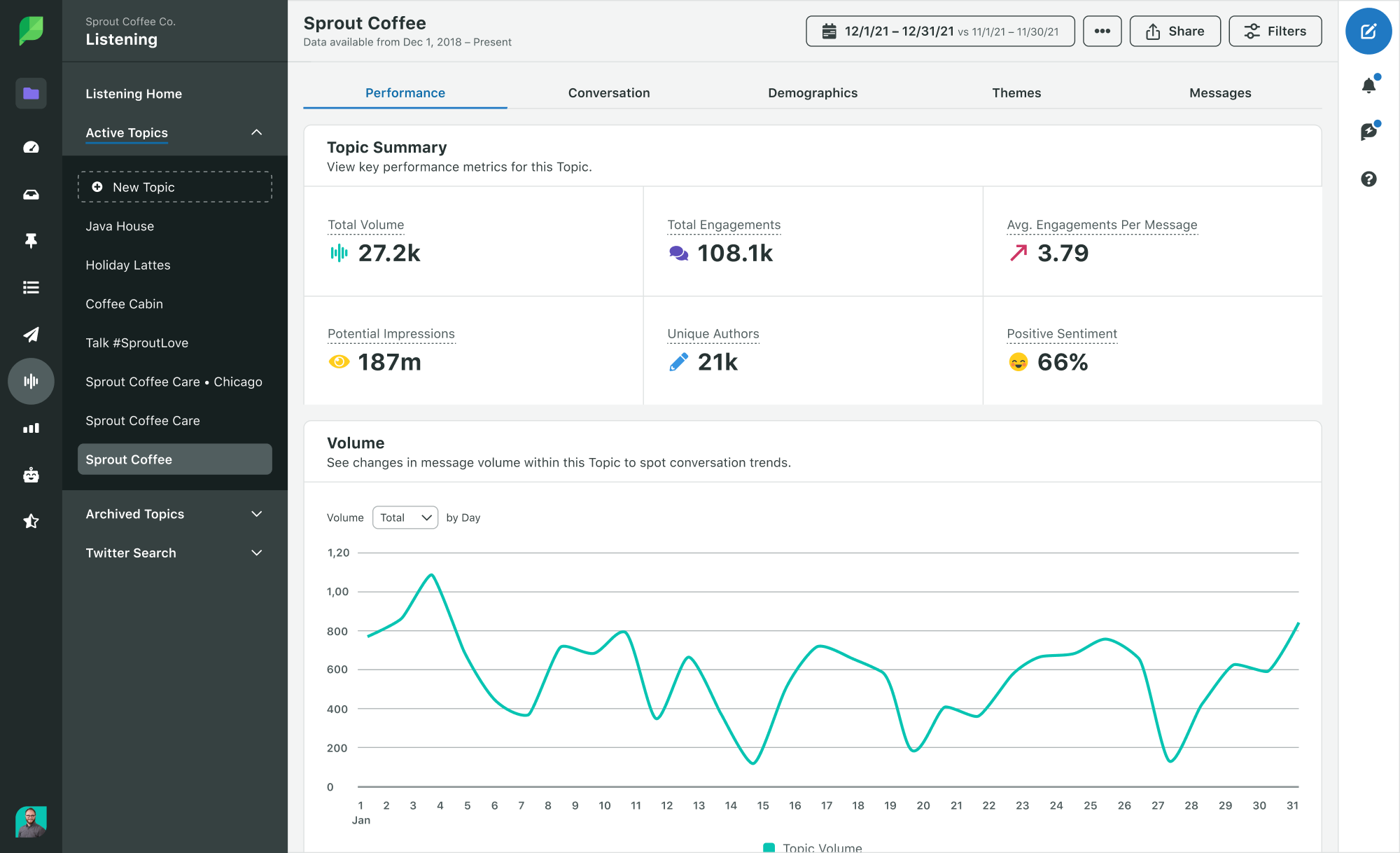
- Sentiment analysis: Track customer sentiment around specific keywords. Explore their feelings and opinions about your own brand, competitors, products, campaigns, events, trending topics and more.
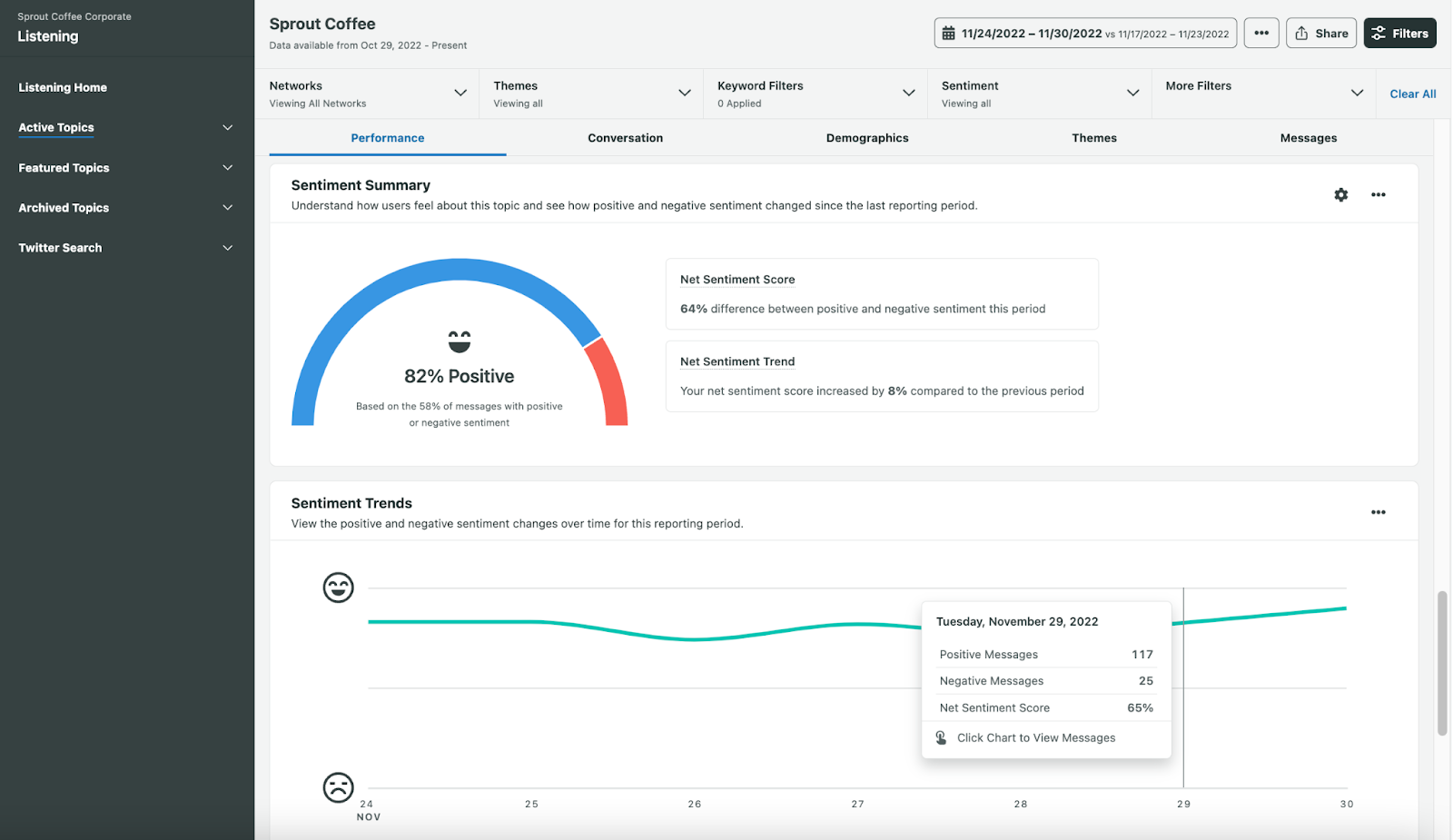
- Premium analytics: Track metrics across multiple social platforms, including Facebook, Instagram, X (Twitter) and LinkedIn. Visualize data with interactive charts and graphs that you can customize according to your goals.

With Sprout’s listening, analytics and reporting tools, you can dig deep into your competitor’s strategy, compare it with your own and identify opportunities to differentiate yourself.
2. Similarweb
Similarweb is a powerful competitive intelligence tool that gives you a comprehensive, visual view of your competitors’ digital presence.
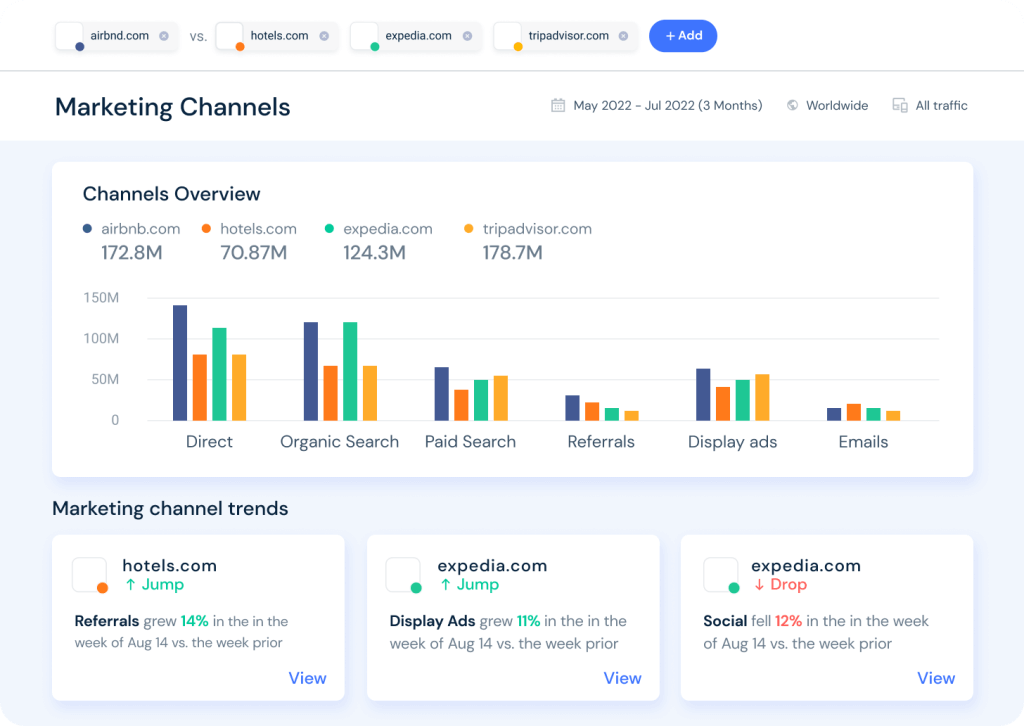
The platform lets you explore the traffic, engagement, marketing channels, keywords, content, affiliates and PPC ad campaigns of up to 25 competitor websites at a time. You can also benchmark your performance against your competitors and track their metrics over time.
3. Reputation
Reputation specializes in analyzing customer feedback and reviews. Along with this, Reputation offers competitive intelligence tools for tracking, comparing and analyzing competitor data.
Build a custom dashboard to compare select competitors and benchmark performance, track customer sentiment in real time and use AI to pinpoint strengths and weaknesses.
You can also track trends and opportunities, receive recommendations from the platform and generate visual competitor reports to share with your team or management.
4. Klue
Klue is an AI-powered competitive intelligence platform that streamlines the process of collecting, analyzing and distributing competitor data.
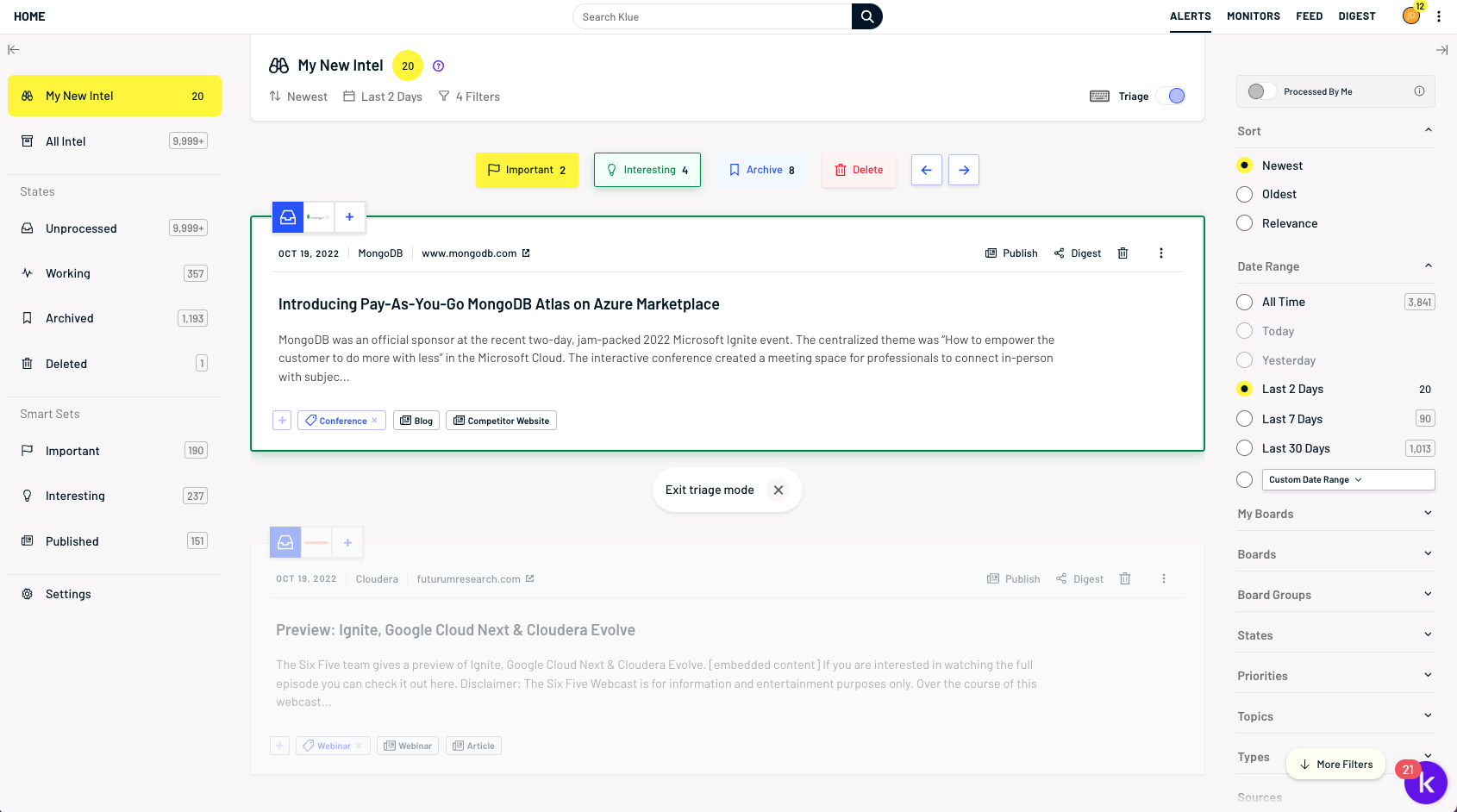
Aggregate information from various sources about competitors, create and share battlecards, profiles and dashboards with your team, analyze market trends and competitor strategies, and distribute intel directly to your existing tech stack, including Slack and Salesforce.
5. Visualping
Visualping is a website monitoring tool that lets you track changes on specific pages. You can set up alerts to notify your team as soon as there’s an update, such as a new landing page design, a price drop or a new banner ad.

The tool also offers advanced AI analysis so you can pinpoint exactly what changed, compare it to previous versions and view visual and text summaries. You can also invite more users and send alerts via email or popular apps like Slack, Google Sheets and Teams.
6. Insightsfirst
Insightsfirst is an AI-driven competitive intelligence platform by Evalueserve. It curates competitive data from various sources, centralizes and filters through it using AI, and then distributes the insights via alerts, integrations and newsletters.
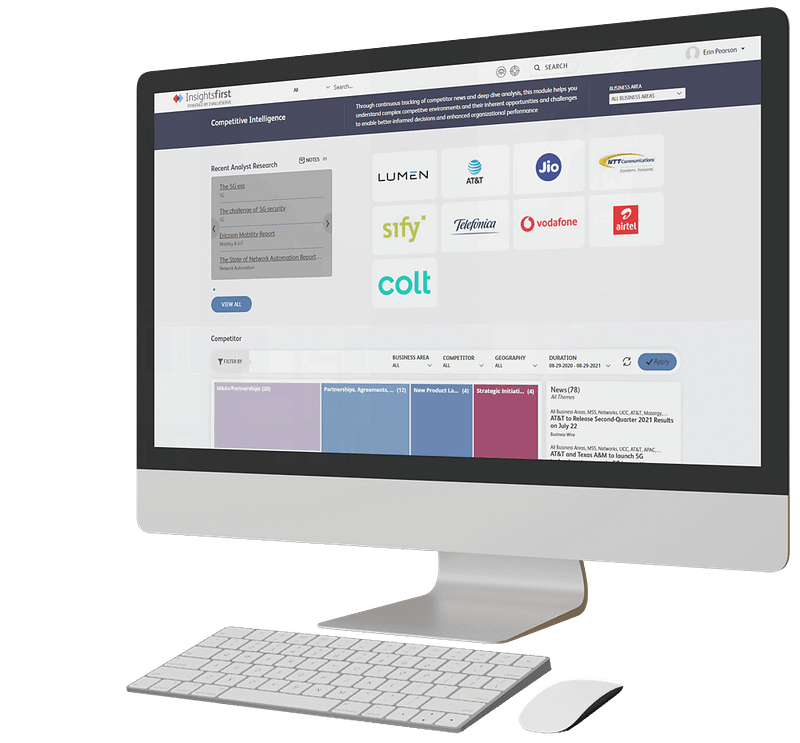
Access insights into industry trends and forecasts, track and analyze news related to competitors, and present information in an easily digestible way using data visualization.
7. Crayon
Crayon is an AI-powered competitive intelligence tool that helps sales teams analyze and use competitive data to score deals.
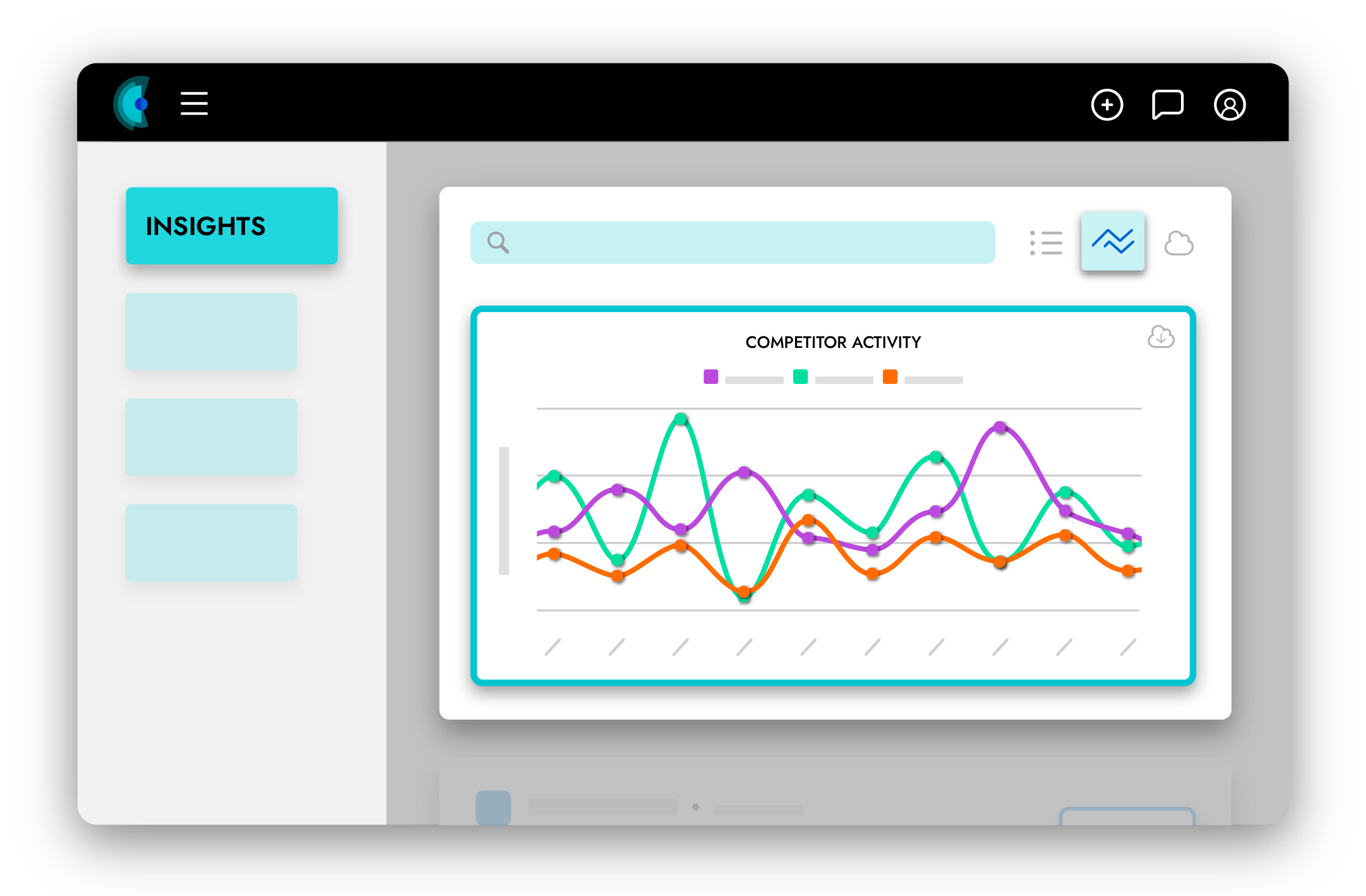
The platform summarizes, prioritizes and delivers insights directly to your inbox, helps you create sales enablement content like battlecards, leaderboards and newsletters, and even shows you data on how your team is using competitive insights.
8. Data.ai
Data.ai (formerly App Annie) provides analytics and market intelligence for mobile apps. Track competitor data like top performing apps, number of downloads, engagement, revenue, usage, app features and even ad creatives.
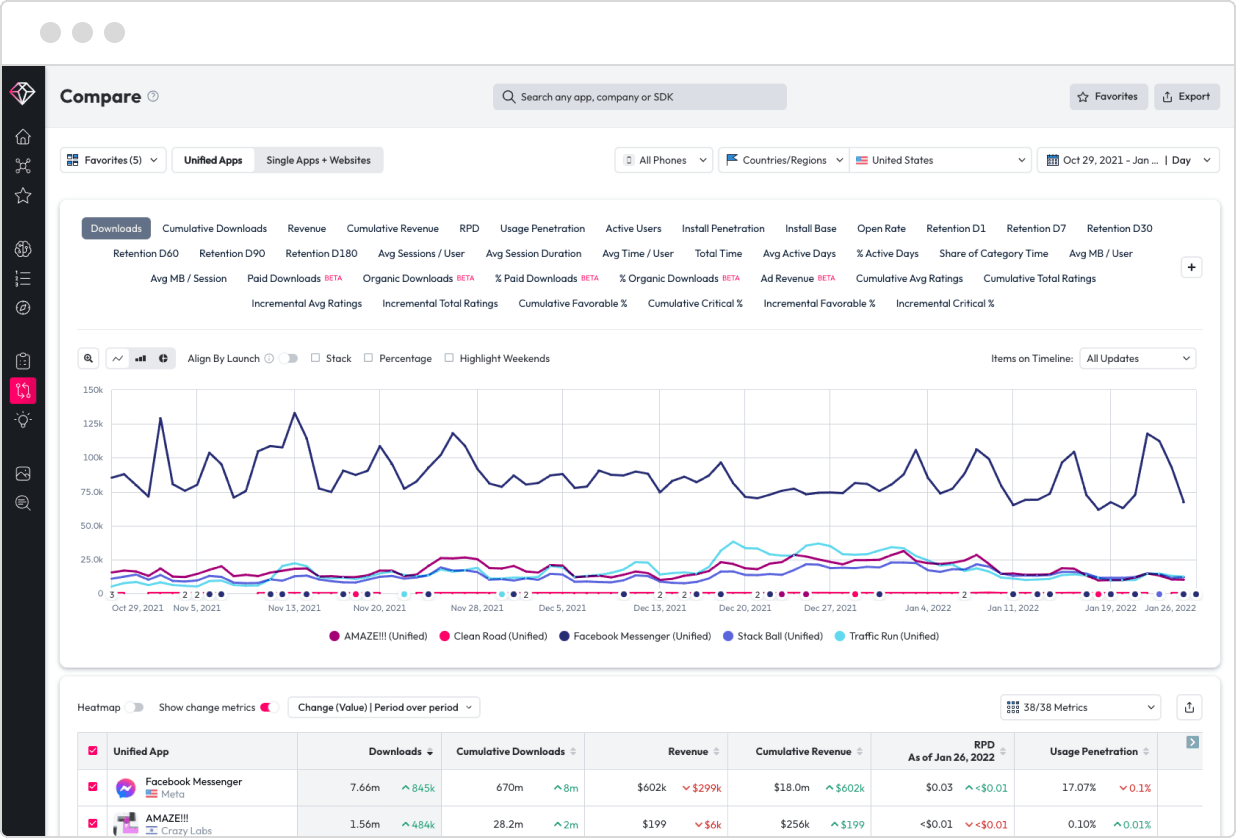
Identify threats by analyzing performance trends across your app category, track growth and rank data over time, and keep an eye on competitor app market share.
9. Contify
Contify’s enterprise-level competitive intelligence platform collects data form 500,000+ customizable sources, including websites, social media, press releases and regulatory portals.
It also analyzes that data using machine learning, presenting it visually using dedicated dashboards. You can also distribute competitor data via curated newsfeeds, automated emails, news APIs and branded newsletter reports.
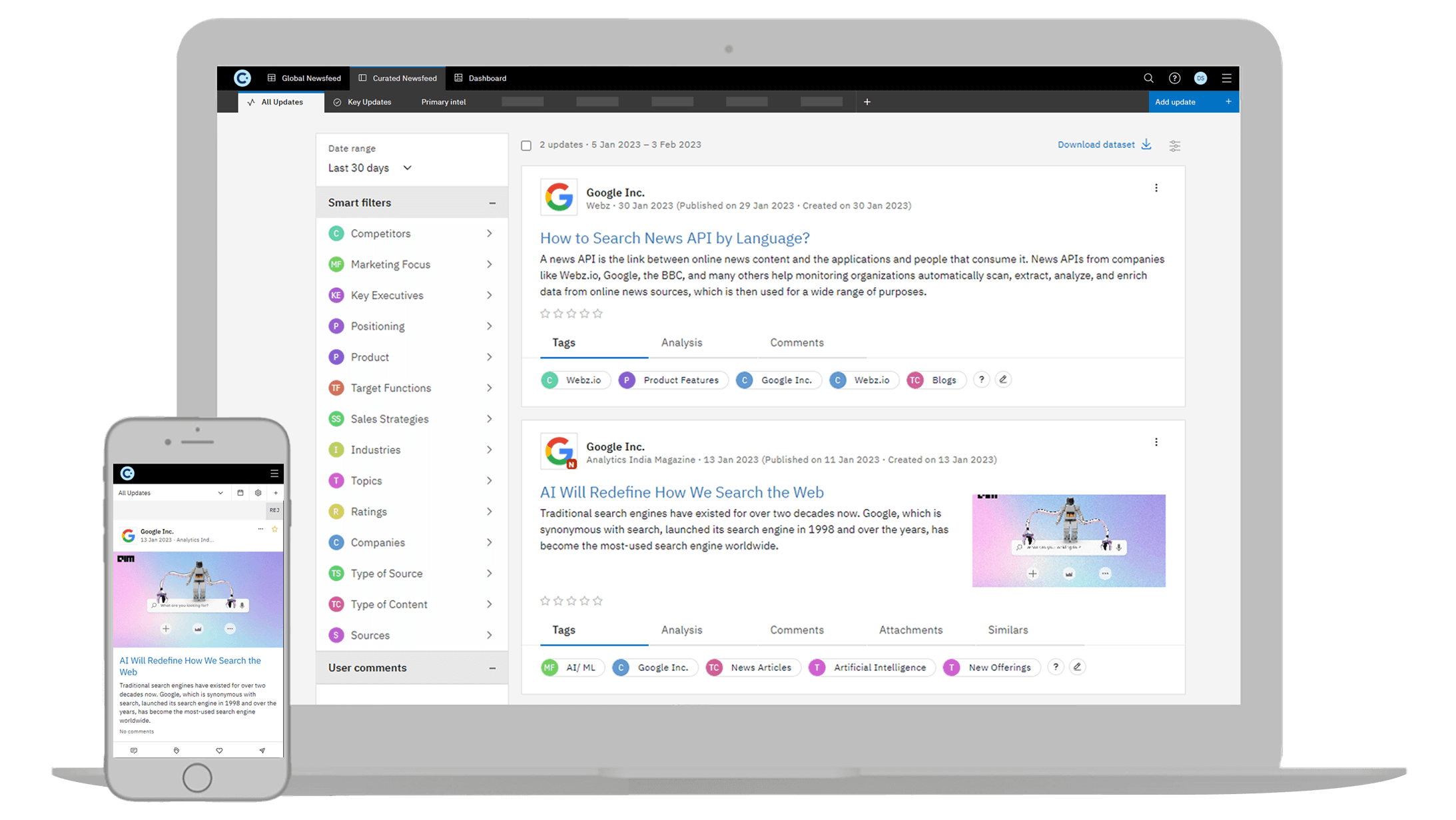
The tool also offers a website change tracker that helps you stay on top of competitor strategies like pricing changes, rebrands, design tweaks, new deals, display ads and more.
10. Semrush
Semrush is one of the most popular SEO tools out there, but it also comes with powerful competitive intelligence features to help you stay ahead of the game.
The platform offers tools to analyze your competitor’s website traffic, backlinks, paid ad campaigns, keywords they’re ranking for and even their social media performance.

Semrush’s Market Explorer tool also gives you a bird’s eye view of any industry or niche—track trends in growth, audience and traffic, and detect leaders and emerging players.
11. Ahrefs
Ahrefs is another well-known SEO platform that offers robust competitive intelligence tools. Their Site Explorer, in particular, lets you double down on your competitors’ websites and analyze their top organic keywords, backlinks, pages, content and more.

Fun fact—the tool boasts the fastest backlink crawler in the industry and the biggest database of live backlinks. Additionally, you can use the Content Explorer to find popular content and link opportunities in your niche.
12. Media Radar
Media Radar is an advertising intelligence platform that lets you compare your competitors’ ad campaigns and media buying strategies with your own.
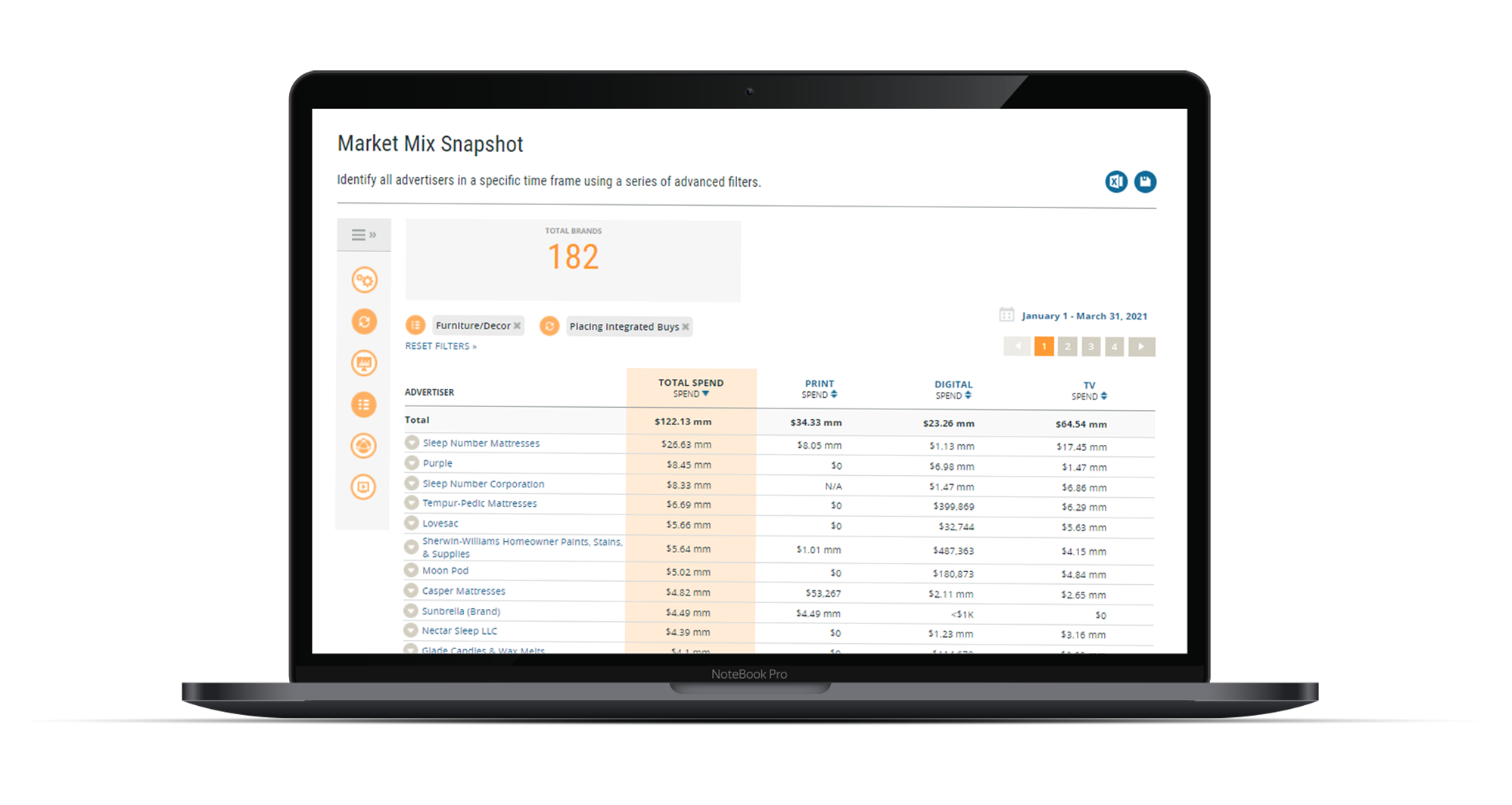
Compare ad investment, review ad creatives across multiple formats, analyze messaging and see where your competitors are placing their ads.
Test a competitive intelligence tool
Keeping track of competitor activity and analyzing their strategic moves helps your business make timely and better decisions in every aspect. More importantly, it helps you stay relevant, innovative and competitive in your industry.
Use Sprout Social’s competitive intelligence tools to gather, analyze and present data related to your competitors’ social media presence. Track metrics, analyze sentiment, benchmark performance and create customized reports that empower your team to stay ahead.
Want to get started today? Try Sprout Social for free with a 30-day trial.
- Categories
Competitive insights: 6 essential market factors and how you can collect them
Published on April 23, 2024 Reading time 9 minutes - Categories
How to build a competitive analysis report with examples and tools
Published on March 7, 2024 Reading time 8 minutes - Categories
Business intelligence reporting: making sense of your organization’s data
Published on February 21, 2024 Reading time 8 minutes - Categories
Competitor mapping: The benefits and how to create your own
Published on February 8, 2024 Reading time 5 minutes


Share